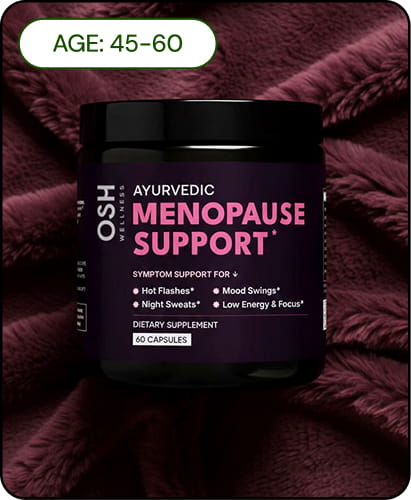Table of contents
Prenatal vitamins are essential for a healthy pregnancy, providing the nutrients you and your baby need to thrive. But let's be real - even though they're good for you, they can sometimes cause a few annoying side effects.
You might have noticed that things aren't quite as regular as they used to be since you started taking your prenatal vitamins. Or maybe you've been feeling a little itchy lately. Don't worry, you're not alone! Prenatal vitamins can sometimes cause minor side effects in pregnant women.
So what's actually in these vitamins, and why do they sometimes cause these pesky side effects?
In this blog, we'll give you a quick overview of prenatal vitamins and their potential benefits and side effects. For now, let's get you up to speed on what to expect when you're expecting...prenatal vitamins, that is!
What are Prenatal Vitamins?
Prenatal vitamins are specially formulated supplements designed to provide the extra nutrients you and your baby need during pregnancy. They contain higher amounts of key vitamins and minerals like folic acid, iron, calcium, and iodine compared to regular multivitamins [1].
Taking good prenatal vitamins is an important part of prenatal care, as they help address dietary deficiencies that may occur even if you eat a balanced diet. Many doctors recommend starting prenatal vitamins at least a month before conception and continuing throughout pregnancy and breastfeeding.
Because prenatal vitamins are so crucial over a lengthy period of time, it’s important to look for a prenatal vitamin that has been lab-tested for heavy metals and impurities and contains the recommended daily amounts of essential nutrients for a healthy pregnancy.

Can I take regular multivitamins while pregnant?
Prenatal vitamins are specifically formulated to meet the increased nutritional needs of women during pregnancy. While regular multivitamins provide a general balance of essential vitamins and minerals, prenatal vitamins contain higher amounts of key nutrients critical for fetal development and maternal health.
The most significant difference is the amount of Folate or Folic Acid. Prenatal vitamins contain at least 400-800 mcg of folic acid, compared to 400 mcg in regular multivitamins. Prenatal vitamins also contain more iron. The recommended daily amount of iron increases from 18 mg for non-pregnant women to 27 mg during pregnancy. Some prenatal vitamins also include beneficial fatty acids and higher amounts of calcium, vitamin D, choline, omega-3s, B vitamins, and vitamin C.

Which ingredients should I look for in prenatal vitamins?
Some of the most important vitamins and minerals for pregnancy that are not present in sufficient quantity in usual multivitamins include the following:
- Folate: Folate is especially crucial, as it can prevent serious birth defects of the baby's brain and spine that occur very early in pregnancy, often before you even know you're pregnant. Doctors recommend that any woman who could become pregnant take 400-800 mcg of folic acid daily, starting at least a month before conception and continuing through the first 12 weeks. If you've had a previous pregnancy affected by these neural tube defects, your doctor may advise an even higher dose.
- Calcium: Calcium is vital for building your baby's bones and teeth, while iron helps your body produce the extra blood needed to support your growing little one.
- Iodine: Iodine is critical for healthy thyroid function and brain development.
- Choline: Choline is important for the cognitive development of the baby.
- Iron: During pregnancy, your body uses iron to make more blood needed to supply oxygen to you and your growing baby. Iron deficiency can affect a baby's growth and increase the risk of early birth.
Taking a high-quality prenatal vitamin before and during pregnancy, along with eating a balanced diet, can help reduce the risk of preterm birth, low birth weight, and certain birth defects.
Benefits of Prenatal Vitamins
Taking prenatal vitamins is one of the best things you can do for your and your baby's health during pregnancy. They provide the extra nutrients you need to support your growing little one and minimize certain risks.
Even if you eat a balanced diet, it can be hard to get all the folic acid, iron, calcium, and other key vitamins and minerals in the amounts you need from food alone. Here are the key benefits of taking prenatal vitamins:
Prenatal vitamins reduce the risk of neural tube defects like spina bifida by up to 70% when taking sufficient folic acid before and early in pregnancy [2].
They may lower the risk of other birth defects like cleft lip/palate and certain heart defects by about a third [3].
Folic acid supplements may also reduce the risk of developing preeclampsia, a dangerous pregnancy complication [4].
They also help prevent iron deficiency or acute blood loss anaemia in the postpartum periods [5].
Reduces the risk of preterm delivery, low birth weight, and infant mortality by preventing iron deficiency.
Provides enough calcium for your baby's bone, tooth, heart, nerve, and muscle development.
Helps protect your own bone health and prevent conditions like rickets in your baby by supplying vitamin D.
Gives you peace of mind knowing you and your baby are getting the essential nutrients needed for a healthy pregnancy.
Elite Prenatal
Formulated with 26 essential vitamins, nutrients, and botanicals, Elite Prenatal is one of the most comprehensive prenatal vitamin available.
When to Start Taking Prenatal Vitamins

The best time to start taking prenatal vitamins is before you even start trying to get pregnant. In fact, many doctors recommend that any woman of childbearing age take a prenatal vitamin, even if pregnancy isn't on the immediate horizon. That's because the key nutrients in prenatal vitamins, like folic acid, are crucial for healthy fetal development right from the start - often before you even know you're pregnant.
Ideally, you'll start taking a prenatal vitamin at least a month before you begin trying to conceive. This gives your body time to build up the right levels of important vitamins and minerals like folic acid, iron, calcium, and iodine. And if your pregnancy is unexpected, don't worry - just start taking a prenatal as soon as you find out. The earlier you can get those essential nutrients, the better for your baby's growth and development.
Most experts recommend continuing to take your prenatal vitamin throughout your pregnancy and even while breastfeeding. Your body and your baby need that extra nutritional boost the entire time.
OSH Wellness’ prenatal supplement is one of the most comprehensive prenatal vitamins available. It is formulated with 26 essential vitamins, nutrients and botanicals in their most bioavailable form.
Side Effects of Prenatal Vitamins
While prenatal vitamins are essential for a healthy pregnancy, they can cause mild side effects. The good news is there are usually ways to manage these symptoms so you can get the nutrients you and your baby need.
The most common side effects of prenatal vitamins include nausea, constipation, and upset stomach. This is often due to the high amounts of certain vitamins and minerals, like iron, that are included in prenatal formulas. Elite Prenatal uses chelated Iron which is more bioavailable than other forms, and gentle on the stomach.
If you find the prenatal vitamins you're taking are causing nausea, try taking them with food or at bedtime. Switching to a smaller, chewable, or liquid prenatal vitamin may also help. For constipation, make sure you're drinking plenty of water and getting enough fiber in your diet. Your doctor may also recommend a stool softener.
In some cases, the side effects can be more severe, like severe nausea, vomiting, or diarrhea. If you experience these, talk to your doctor right away. They may suggest a different brand or formula of prenatal vitamins that's easier for your body to tolerate.
The key is finding a prenatal vitamin that provides the nutrients you need without causing unpleasant side effects.

Conclusion
Prenatal vitamins are a must-have for any woman who is pregnant or planning to become pregnant. They help close nutritional gaps and ensure you and your baby get the essential vitamins and minerals needed for a healthy pregnancy and birth. Speak to your doctor about finding the right prenatal vitamin for your specific needs.
1. What do prenatal vitamins do?
Prenatal vitamins provide the extra nutrients pregnant women need, such as folic acid to prevent birth defects, iron to make more blood, calcium for baby's bones, and iodine for healthy brain development. They help fill nutritional gaps and support the health of both mom and baby during pregnancy.
2. When should you start taking prenatal vitamins?
The best time to start taking prenatal vitamins is at least 1 month before conception and continue throughout pregnancy and breastfeeding. Folic acid is especially important in early pregnancy to prevent neural tube defects. Talk to your doctor about the right prenatal vitamin for you and when to begin taking it.
3. What is the best prenatal vitamin for pregnancy?
OSH Wellness' prenatal care is a unique blend of vitamins A, C, D, E, K, folate, B12, B6, biotin, choline, iron, zinc, and selenium. This comprehensive formula helps support fetal development, maternal health, and overall wellness during pregnancy. The high-quality ingredients and optimal dosages make it one of the best prenatal vitamins for a healthy pregnancy.
4. Are prenatals necessary?
Yes, prenatal vitamins are considered necessary for a healthy pregnancy. They provide essential nutrients like folic acid, iron, calcium, and iodine that are crucial for fetal development and maternal health. Even if you eat a balanced diet, it can be difficult to get all the recommended amounts from food alone. Prenatal vitamins help bridge nutritional gaps.









